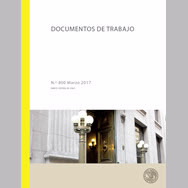Working Papers N°8: Does Income Inequality Raise Aggregate Saving?
Publications
Working Papers N°8: Does Income Inequality Raise Aggregate Saving?
Autor: Klaus Schmidt-Hebbel , Luis Servén
Description
This paper reviews analytically and empirically the links between income distribution and aggregate saving. Consumption theory brings out a number of direct channels through which income inequality can affect overall household saving -- positively in most cases. However, recent political-economy theory points toward indirect, negative effects of inequality -- through investment, growth, and public saving -- on aggregate saving. On theoretical grounds the sign of the saving-inequality link is therefore ambiguous. This paper presents new empirical evidence on the relationship between income distribution and aggregate saving, based on a new and improved income distribution database for both industrial and developing countries. The empirical results, using alternative inequality and saving measures and various econometric specifications on both cross-section and panel data, provide no support for the notion that income inequality has any systematic effect on aggregate saving. These findings are consistent with the theoretical ambiguity but contrast with previous empirical literature that found a positive cross-country association between income inequality and aggregate saving.
Working Papers N°8: Does Income Inequality Raise Aggregate Saving?
Boxes and graphics

